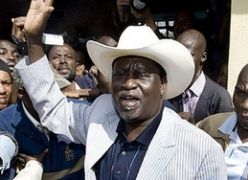Opposition leader leads Kenya race for the presidency
December 29, 2007 (NAIROBI) — Kenya’s opposition challenger Raila Odinga on Saturday led in the race to govern east Africa’s largest economy, in a tight contest that has seen a dozen government ministers thrown out.
 As vote counting entered its third day amid grumbles about the slow pace, Odinga, heir of a wealthy nationalist hero, led President Mwai Kibaki, many of whose allies fell in their parliamentary races.
As vote counting entered its third day amid grumbles about the slow pace, Odinga, heir of a wealthy nationalist hero, led President Mwai Kibaki, many of whose allies fell in their parliamentary races.
By 0200 a.m. (2300 GMT), the Electoral Commission of Kenya (ECK) had released results from 80 of the country’s 210 constituencies, with Odinga leading by 1,884,096 votes to 1,516,259 for Kibaki.
Three local TV stations aired unofficial, partial results showing Odinga well ahead. KTN had him on 3.7 million votes versus Kibaki’s 3.1 million. Taken together, that is more than half the 8 to 11 million votes thought to have been cast from among Kenya’s 14 million registered voters.
“The turnout per constituency has been ranging between 60 and 70 percent and even 80 percent in some cases. The average will be within that range,” ECK Vice Chairman Kihara Muttu told Reuters, adding that he had no firm turnout figure.
The ECK earlier had said it was likely to be a record for the east African nation of 36 million, which has held four multi-party polls and only two considered truly democratic.
If Odinga, 62, wins, he would make Kibaki the first of Kenya’s three post-independence presidents to lose at the polls in a symbolic end to the nation’s political old guard.
Kibaki, 76, has been in politics for all of Kenya’s post-independence era. He came to power amid joy and hope when his election in 2002 ended 39 years of single-party rule that became synonymous with corruption, oppression and inaction.
OUT WITH THE OLD
Analysts said it was still too early to call the result of what has become Kenya’s tightest race since independence from Britain in 1963, owing to the intricacies of the country’s tendency to vote along tribal and geographic lines.
One verdict was clear — Kenyans were unhappy with many of their sitting parliamentarians, who were roundly criticised for laziness except when it came to voting themselves pay raises.
A dozen ministers lost their jobs, and angry constituents rejected 2004 Nobel Peace Prize laureate Wangari Maathai.
Diplomats have praised the election process so far as smooth and largely peaceful, despite rigging accusations by both sides and some sporadic violence typical of Kenya’s polls since 1992.
“I think the voter turnout is a tremendous compliment to all Kenyans. In the United States we are lucky if we get 50 percent turnout,” U.S. ambassador Michael Ranneberger told reporters at the ECK’s election headquarters.
Ranneberger said he had confidence that the count was being done transparently. The opposition was not so sure, and again accused the government of imposing a delay to rig the results.
“Is this a strategy to impose a rejected regime on the people?” asked opposition official Joseph Nyaga.
Civil society groups in a statement complained that the ECK was “moving at a snail’s pace” and warned it must speed up or risk sparking disputes over the results.
The ECK denied any malpractice.
(Reuters)
